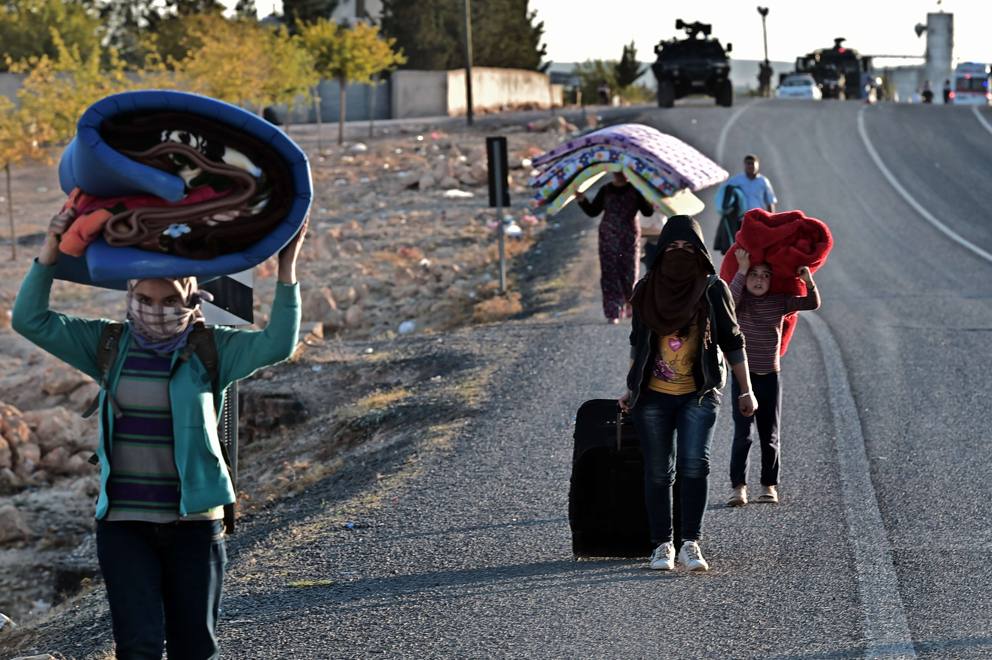REFUGEES
Ongoing migration flows towards Macedonia through Greece. Clashes on the Serbia-Hungarian border. The voice of witnesses

Over the last two months 42 thousand migrants fleeing Syria and the Middle East, entered Macedonia from Greece, turning the small Balkan country into a transit country on their way to their final destination: the West. In the weekend of August 22 as many as 7 thousand people crossed the territory of Macedonia in Serbia and continued their journey to Hungary, headed to Germany or France. However, thousands of migrants remained camped in the small railway station of Gevgelija. In an attempt to normalize the situation, on August 20 the government of Skopje closed the border with Greece. However, this raised tensions among the multitudes crammed for days in the rural areas between the two countries. The situation escalated with incidents and clashes with police. The border was later reopened and the situation has normalized, but the flow of people does not decrease. Thousands at the border. “On the border I saw many people, mostly Syrians, but also Afghans and Africans. There are entire families, women, young children, who have been traveling from Syria for over 10 days”, Nikolaj Krastev, reporter at the Bulgarian National Radio, told SIR Europe. “They are frightened and confused, they complained about the fact that they were rarely helped, and that, because of the war, they were forced to undertake this dangerous journey”. They reach Greece, many of them land on the Aegean islands, but owing to the difficult political situation in the country Greek authorities facilitate their passage to Macedonia, because the Bulgarian border is well protected. According to workers of local NGOs, Skopje’s decision to close the border “increased the tensions between these people already exhausted and tired.” “It became evident they could not be held at the border, and slowly the situation calmed down”, added Krastev, who explained that “five thousand people, camped out in the station of the town of Gevgelija, were transported by bus to the border with Serbia.” “They received passes, and medical kits with necessaries”. The emergency after the political crisis. “This emergency is a great challenge for Macedonia, that went through a serious political crisis in recent months”, Krastev said. “After the massive protests against the authoritarian policies of President Nikola Gruevski, the parties had finally reached an agreement”. “The problem of migrants, however – he went on – fuels political speculation, and in this case also international relations, because it seems that the countries of the region shuffle off the responsibility to these people”. Caritas assistance. Non-governmental organizations and Caritas Macedonia are in the front line at the border and along the refugees’ journey. “Our organization is a small reality here (there are some 15 thousand Catholics in the Country within an overall population of 2 million), but we can’t fail to rescue these people in need”, said the director of Caritas Macedonia, Msgr. Antun Cirimotik. In the area near Tabanovtse, a city on the Serbian border, volunteers distribute basic necessities kits, food and drinks. “We wait for the help of the Caritas network – continued Msgr. Cirimotik – because of the high numbers of people. We are faced with the problem of how to help them and handle their situation”. The director of Caritas Macedonia said he is concerned because “it seems that our small Country is abandoned to handle this inflow alone”. Recalling the situation of refugees from Kosovo, Msgr. Cirimotik said: “at the time there were reception centres along with the solidarity of many European Countries that today seems to have vanished”. In his opinion, “there is a need for a common migration policy for Europe, while the international community must intervene in some way regarding the situation in Syria”. Increasing arrivals. According to the UN High Commissioner for Refugees “EU Countries must increase their aid to Greece, Macedonia and Serbia”. The Red Cross estimates that “migration flows will surge dramatically owing to the numbers of migrants expected to land on Greek islands in the coming days”. In the meantime, in Macedonia, 500 metres from the Greek border, was opened a reception centre for refugees only. Serbian authorities set up four centres, two in the South (Presevo and Miratovac) and two in the north, on the border with Hungary (Kanijia e Subotica). Furthermore, a centre will soon be opened near Belgrade, while there are plans to set up an info centre for refugees. The tragedy of migrants. “Closing the borders and erecting walls doesn’t solve the problem”, claimed Zoran Jordanovski, chief editor at the Macedonian desk of Deutche Welle, that is following the developments of the situation up close. “There are thousands of human destinies and the pressure is bound to increase”. “Urgent measures are direly needed – the journalist added with concern – to prevent the tragedy of migrants from becoming a humanitarian tragedy”.